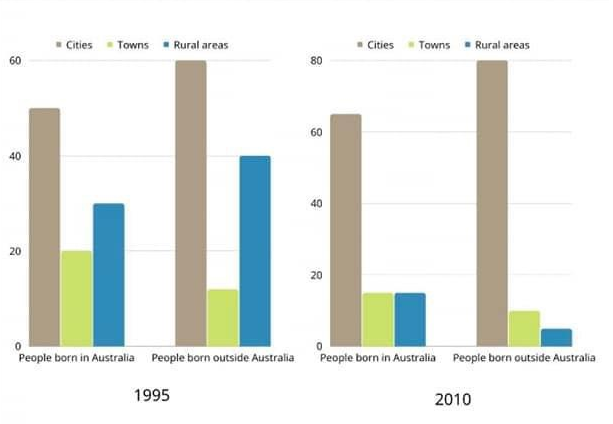[mohit g] Writing Practice Test 1344523
Task 1
You should spend about 20 minutes on this task.
The bar chart below describes some changes about the percentage of people were born in Australia and who were born outside Australia living in urban, rural and town between 1995 and 2010.
Summarise the information by selecting and reporting the main features and make comparisons where relevant.
You should write at least 150 words.

The bar graph shows a few differences that took place in the number of people born in Australia and others born outside Australia, residing in urban areas, rural areas and towns from 1995 to 2010.
Overall, it can be seen that majority of people born in Australia and those born outside Australia reside in cities. Living in the city was most popular choice in 1995 as well as 2010. In 1995, least number of people were living in towns, irrespective of where they were born. However, this changed in 2010, where the minority was residing in rural areas.
In 1995, 50% of people born in Australia were living in cities whereas 20% and 30% of them resided in towns and rural areas respectively. Considering people born outside Australia, majority of them lived in cities at 60%. While the rest were living in towns and rural areas.
After 15 years, number of individual in cities increased to 65% and 80% for both Australians and Non Australians respectively. Australians were equally distributed in towns and rural areas whereas people born elsewhere, were least present in rural areas.
Task 2
You should spend about 40 minutes on this task.
Rich countries often give money to poorer countries, but it does not solve poverty. Therefore, developed countries should give other types of help to the poor countries rather than financial aid. To what extent do you agree or disagree?
You should write at least 250 words.
Countries with weak economies should be helped by other means, rather than monetary aid by rich countries. As poverty is often not solved by the money, developed nations provide to the poorer ones. This essay agrees with this statement and discusses the appropriate reasons for the same.
Monetary help to developing nations should be avoided as it rarely help the individuals in need. It is often observed that poor countries have higher rate of corruption as survival is difficult there. Therefore, majority of the aid goes in the pockets of people in power and never really reaches the local man. For instance, in 2001, the BBC reported that out of the total financial aid Pakistan recieved from the US, 75% of it was distributed unethically among the people involved.
Additionally, the money recieved by economically weaker countries cannot be used instantaneously. Proper utilization of the grant takes time, sometimes years. Over the years, the poor counties usually lose the value of their currency. therefore, the aid will also lose its value even if used ethically. Because the currency conversion generally takes place within the year during which, the monetary help is announced.
For example, according to a report by The Times of India, Sri Lanka received a grant of 10 million dollars in 2003, approximately 2 billion Sri lankan rupees. It was completely used in 2015, by then the 2 billion Sri Lankan rupees were worth only 5 million USD. The aid lost its value by 50%.
To conclude, powerfull nations should not provide monetary help to poor countries as money never reaches the needy, apart from that, many countries loose the value of their grant due to improper utilization.
Community’s feedback
Sorry! We couldn't find any contents.
Score Given by Community
Give a bandscoreLeaderboard:
| # | User | Score | Time | |
|---|---|---|---|---|
| Kento Nanami |  | 8.5 | 52:31 | |
| Nayef Alhajraf |  | 8.5 | 60:00 | |
| Ella Ruppo |  | 7.5 | 59:39 | |
| 4 | chengxi yu |  | 7.0 | 00:00 |
| 5 | avin chui |  | 7.0 | 59:11 |
| 6 | 癫 火 |  | 7.0 | 59:51 |
| 7 | Li Xuefeng |  | 6.5 | 03:46 |
| 8 | Chanisara Wongkongsang |  | 6.5 | 56:37 |
| 9 | Dan H |  | 6.0 | 50:41 |
| 10 | Carlo Di Giacomo |  | 6.0 | 60:00 |



